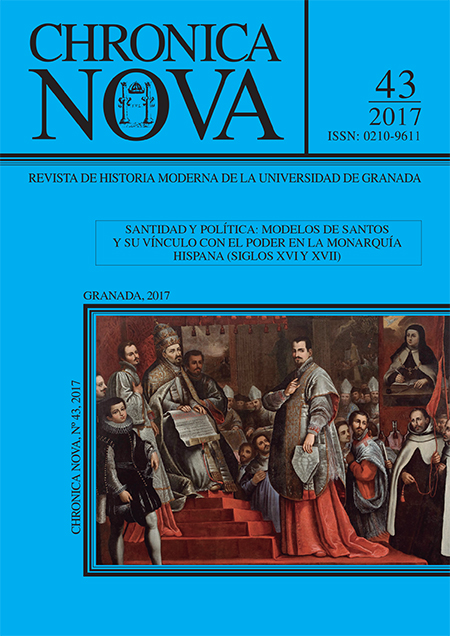Confesionalismo, gobierno y privanza. El cardenal Diego de Espinosa (1565-1572)
DOI:
https://doi.org/10.30827/cn.v0i43.1104Palabras clave:
Confesionalismo, reforma gubernativa, privanza, Cardenal Diego de Espinosa, Felipe II, clientelismoResumen
“Cuius regio, eius religio”. Tras la Dieta de Augsburgo de 1555 los diferentes Príncipes asumieron el compromiso de consolidar las respectivas creencias religiosas en sus reinos. Simultáneamente, aspiraban a la construcción de un régimen administrativo centralizado y eficaz que contribuyera al fortalecimiento de las instituciones de la monarquía. El proceso de cambio envolvía las estructuras de la religión, la política, la sociedad y la cultura. Pero para llevar a cabo una reforma de tal envergadura, los monarcas buscaron la colaboración de hombres destacados a los que confiaron la administración de sus reinos.
En España, el segoviano Diego de Espinosa monopolizó la privanza de Felipe II entre 1565 y 1572. El proceso de confesionalización y reforma gubernativa fue coordinado por el propio Espinosa que en pocos años llegó a desempeñar altos cargos en la corte filipina: Presidente del Consejo de Castilla y Presidente del Consejo de la Inquisición o Inquisidor General.
En esta investigación, el autor se propone analizar la trayectoria personal, política y religiosa de Espinosa ya que, mientras disfrutó de la gracia del monarca, logró articular un programa de reformas confesionales con un fuerte sentido religioso pero que asimismo buscaban la defensa del regalismo monárquico con la misma intensidad. El caso de Espinosa pone de manifiesto la importancia del fenómeno de patronazgo en la temprana modernidad por lo que intentaremos reconstruir dichas redes clientelares.
Descargas
Descargas
Publicado
Cómo citar
Número
Sección
Licencia
Nuestra revista se atiene a las recomendaciones para la implementación del Artículo 37 Difusión en Acceso Abierto de la Ley de la Ciencia, la Tecnología y la Innovación:
- Los/as autores/as cuyas contribuciones sean aceptadas para su publicación en esta revista conservarán el derecho no exclusivo de utilizar sus contribuciones con fines académicos, de investigación y educativos, incluyendo el auto-archivo o depósito de los artículos aceptados en repositorios institucionales o temáticos de acceso abierto de cualquier tipo en un plazo máximo de seis meses.
- Preferiblemente se permitirá el uso de la versión publicada de las contribuciones científicas, que estarán accesibles en abierto tan pronto como sea posible.
-
Que en caso de que el trabajo sea aprobado para su publicación, el/la autor/a autoriza de manera ilimitada en el tiempo a la entidad editora para que incluya dicho texto en Chronica Nova y pueda reproducirlo, editarlo, distribuirlo, exhibirlo y comunicarlo en el país y en el extranjero por medios impresos, electrónicos, CD, Internet o cualquier otro medio conocido o por conocer.






 ISSN-e: 2445-1908
ISSN-e: 2445-1908










